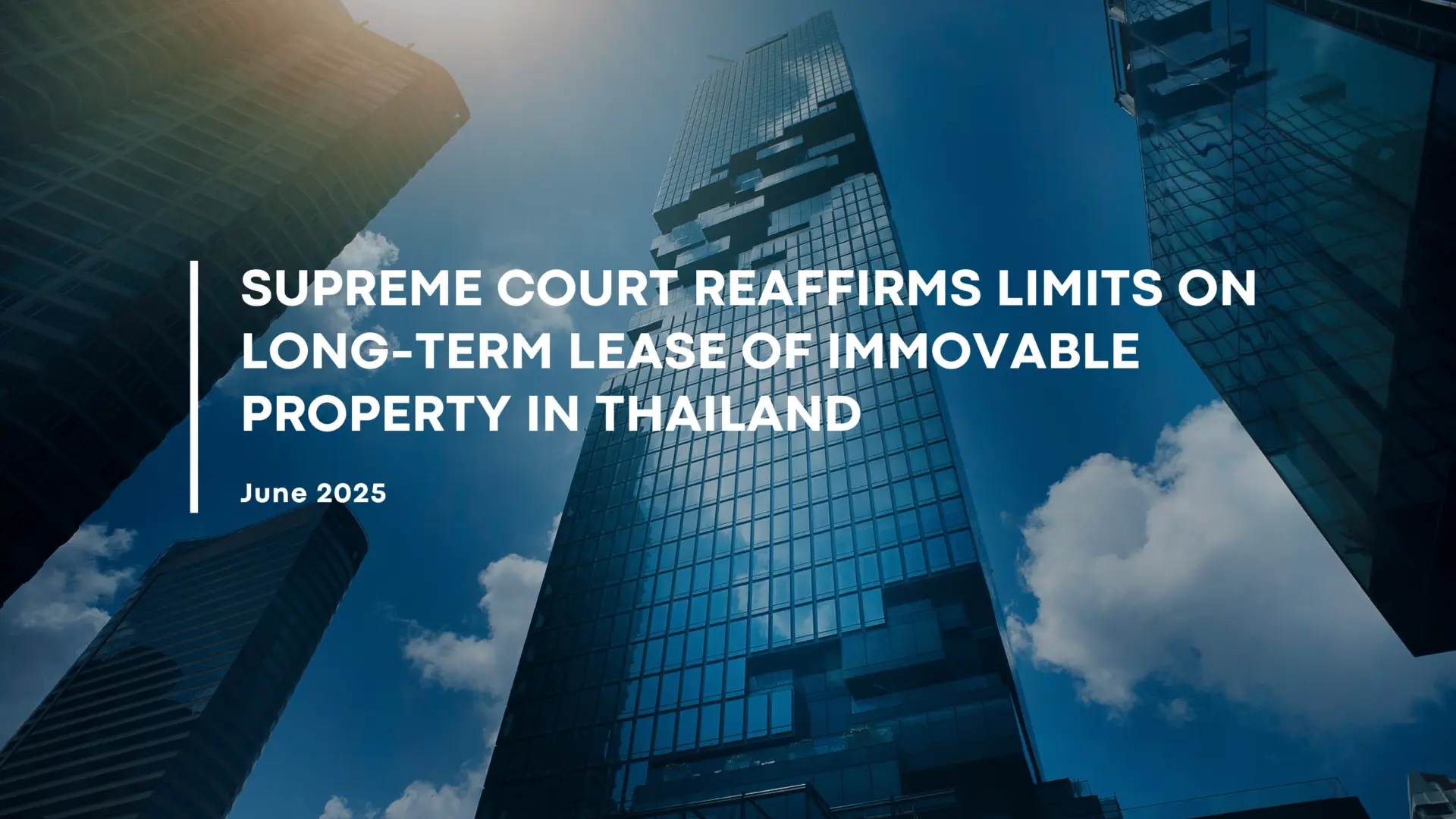A. Introduction
Thailand continues to be an attractive destination for international visitors, with multiple visitors often choosing to relocate or find work in Thailand with the hopes of buying or acquiring property. Given that Thailand has a general prohibition for non-Thai citizens to own land save under certain exceptions, i.e., in designated industrial zones where non-Thai citizens are granted to own land to operate businesses under the Industrial Estate Authority of Thailand Act (IEAT), or for specific activities promoted and approved by the Board of Investment (BOI). For most non-Thai citizens, the primary options for property acquisition are either owning condominium units or entering into long-term lease agreements.
Under Thailand’s Condominium Act, foreigners may legally own freehold condominium units, provided that foreign ownership does not exceed 49% of the total saleable area within any condominium project. Alternatively, non-Thai citizens may enter into long-term leases on land or other types of property. This leasehold arrangement is a popular option, allowing non-Thai citizens to possess and use the property for the duration of the lease term.
However, the legal framework governing long-term leases requires careful navigation. Thai law imposes ceiling and limitations with respect to lease term for immovable property. As a result, 30-year lease agreements have become a widely used mechanism to secure long-term usage rights over immovable property.
Proper structuring of lease agreements, including renewal clauses and registration is essential. Failure to comply with statutory requirements can result in unenforceable agreements, financial loss, and potential legal disputes.
B. Legal Basis for Long-Term Leases in Thailand
Lease of immovable property is governed by the Civil and Commercial Code (“CCC”), specifically:
- Section 538 of CCC stipulates that any lease of immovable property exceeding three years must be made in writing, signed by the parties, and registered with the Land Department to be legally enforceable beyond that period; otherwise, the lease will be enforceable by legal action only for a period of three years. A short-term lease not exceeding three years does not require registration, but it must still be executed in writing in order to be legally valid and enforceable.
- Section 540 of the CCC stipulates that leaseholds in Thailand are strictly limited to a maximum of 30 years. Any lease that purports to exceed this limit is reduced to 30 years. The lease period may be renewed once it has expired, but it must not exceed 30 years from the date of renewal.
C. Recent Supreme Court Decision
On 18 March 2025, the Thai Supreme Court issued a significant decision in Case No. 4655/2566, reaffirming the statutory limitation on long-term leases of immovable property. The Court ruled that a lease agreement attempting to exceed the 30-year maximum lease term by including pre-agreed condition or renewal options for consecutive 30-year terms (i.e., 30+30+30years) is invalid, regardless of the parties’ intentions or any rental payments made throughout the renewal terms. The Court held that such arrangements are contrary to Section 540 of the CCC. Accordingly, leases simply structured in this way will be legally enforceable only for the initial 30-year term.
This ruling is a significant development for leasehold arrangements in Thailand and is likely to serve as a legal precedent in future cases involving similar long-term lease structures, which have been utilised for a number of years by both locals and foreigners.
D. Key Takeaway from the Supreme Court’s Decision
- Lease agreements exceeding the statutory 30-year limit are void beyond the initial term, any excess duration is void.
- Terms that pre-agree automatic renewals from the date of execution are void regardless of any mutual agreement or partial/complete financial arrangements (i.e., rental payments, deposits, or registration with the Land Department).
- Any lease structures such as signing multiple lease contracts or pre-agreed extensions attempting to bypass the 30-year limit may also be invalid.
- The Court’s rationale is based on public policy concerns, including uncertainties on the future condition of the property and unpredictable changes in value or obligations over a long-term contract.
© PDLegal Thailand
This article is intended to provide general information only and does not constitute legal advice. It should not be used as a substitute for professional legal consultation. We recommend seeking legal advice before making any decisions based on the information available in this article. PDLegal fully disclaims responsibility for any loss or damage which may result from relying on this article.
Further information
The recent Supreme Court decision marks a significant development that could reshape the real estate market in Thailand. If you plan to secure long-term property usage rights or enter into a lease agreement in Thailand, it is important to conduct sufficient due diligence and consider structuring the acquisition or lease to maximise long-term value. Our team of legal experts is available to guide you through the process. We will ensure that your agreements are fully compliant with Thai laws and tailored to meet your specific needs. Should you have any questions or need further clarification on how this article may impact your business, please feel free to get in touch with our team:

